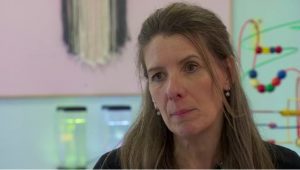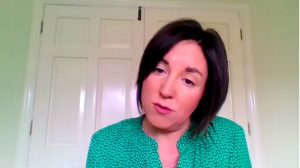Nearly 550 people were potentially trafficked into Northern Ireland last year, according to recent Home Office statistics.
That is an increase of 50% on 2021, when the figure was 363.
In the last four years, the number of people referred through the national referral mechanism in Northern Ireland increased by 1000%.
Modern slavery is a complex crime and may involve multiple forms of exploitation.
It includes human trafficking, slavery, servitude, and forced or compulsory labour.
Victims may not be aware that they are being trafficked or exploited, and may have consented to elements of their exploitation, or accepted their situation.
Potential victims are referred through the national referral mechanism, a Home Office framework for identifying and referring potential victims of modern slavery and ensuring they receive the appropriate support.

Gillian Glass from Belfast & Lisburn Women’s Aid said they support victims of sexual exploitation
Belfast & Lisburn Women’s Aid said it was now helping 260 women and 150 children who had been potentially trafficked into Northern Ireland.
The organisation has been contracted by Stormont’s Department of Justice to provide emotional, financial and practical support for those referred by the mechanism.
‘Sexual exploitation and forced labour’
Gillian Glass from Belfast & Lisburn Women’s Aid said the women they support are generally victims of sexual exploitation as well as forced labour.
“This may have gone on for years since they fled their country,” she told BBC News NI.
“Very often they’re trafficked from country to country.
“For instance, some of the Eritrean women we have worked with have come through Ethiopia, Sudan, into Libya and have been trafficked en route and have unfortunately also been forced to make that journey from Libya into Europe.”
Ms Glass said that women often leave their country because of war, conflict and fear of persecution.
“They will pay a smuggler to help them flee their country but it is very often those same smugglers that become traffickers,” she added.
From 2019 to 2021 the most prevalent nationalities referred through the national referral mechanism in Northern Ireland were Eritrean and Somali.
Many of those being trafficked into Northern Ireland arrive into Dublin and travel north.

Ruth Breslin said the trade and movement of women is extensively organised
Ruth Breslin, a researcher at University College Dublin’s sexual exploitation research programme, said the number of Eritrean and Somali women in the Republic of Ireland is far fewer than in Northern Ireland.
Ms Breslin said traffickers often operate in groups and added the trade and movement of women is “extensively organised”.
“They have domestic and international connections and there are these recognised trafficking routes and so, for sure, we see a recognised trafficking route that starts in Nigeria and ends in the Republic of Ireland,” she explained.
